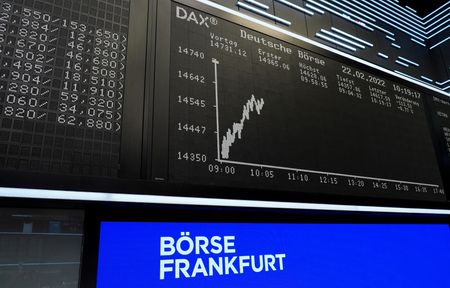A look at the day ahead in European and global markets from Wayne Cole.
Forget soft landing, equities seem to be betting on no landing for the U.S. economy: a sublime state where steady growth and low unemployment can co-exist with slowing inflation and higher interest rates.
That at least would explain the resilience of stocks to blockbuster U.S. retail data and the rise of 10-year Treasury yields to seven-week highs. After an initial dip, Wall Street rallied into the close and futures have since nudged higher, lifting Asian markets in the process.
Given that retail sales comprise 35% of consumption expenditure, the jump in January saw the Atlanta Fed’s GDPNow estimate climb to 2.4% for the first quarter. That’s a marked divergence from the Blue Chip consensus which has been tipping a sharp contraction for the quarter.
Reacting to the run of better data, Goldman Sachs cut the chance of a U.S. recession in the next 12 months to 25%, from 35%. “Activity growth appears to remain positive but below potential, keeping the rebalancing of supply and demand on track,” was Goldman’s conclusion.
In Asia, it’s a testament to how indifferent markets are to Japanese economic data that the largest monthly trade deficit on record came and went with hardly a murmur.
The shortfall of 3.49 trillion yen, or $26 billion, reflected higher import costs for coal, LNG and oil, combined with a drop in exports of cars, car parts and chip-making equipment to China.
That brought the rolling 12-month deficit to a staggering $174 billion, underscoring the ongoing transfer of wealth from manufacturing nations to resource producers.
That flow of money offshore is another reason why the yen is still so weak, despite all the talk of an eventual end to super-easy money by the Bank of Japan.
Speaking of which, Kazuo Ueda, the government’s nominee for BOJ governor, will appear at a confirmation hearing in parliament on Feb. 24.
Markets will be hoping Ueda will clarify just where he sits on the dovish/hawkish scale, or at least offer some clue on how long yield curve control might last. Investors clearly think its days are numbered given 10-year yields have been pinned to the 50-basis-point ceiling for the past week or so.
Key developments that could influence markets on Thursday:
– Central Bank speakers are out en masse, including the ECB’s Panetta, Nagel, Lane, Makhlouf and Guindos; BoE head economist Pill; and central bank officials from Canada, Norway and Sweden. Among the Fed speakers are Mester, Cook and Bullard
– U.S. data includes Jan PPI, housing starts, jobless claims and the Philly Fed index
($1 = 133.6400 yen)
(Reporting by Wayne Cole; Editing by Edmund Klamann)

